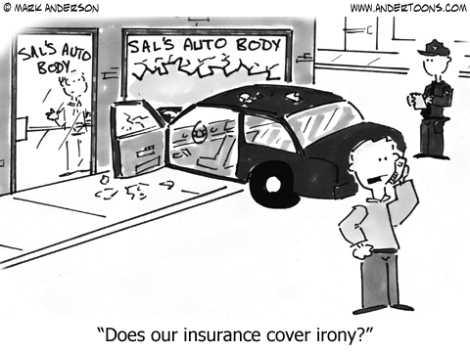So, I had a car accident. Or at least, I sat in a car park, politely waiting for a Vauxhall Zafira to move out of his space before heading on my way. Watching him reverse. And reverse some more. Nervously laughing that he was getting quite close. Then manically banging the dashboard thinking it was the horn as our VW Polo evidently disappeared into thin air, before hearing the crunch of metal hitting slightly cheaper metal.
As soon as the cars hit, my mind started spinning with all the usual thoughts. Do I have insurance details? Was it my fault? Is the car drivable? How, exactly, am I going to get the Walkers Sensation Thai Sweet Chilli Crisps back to the group of friends waiting for them with empty bowls and savoury-snack addictions? With these vital questions waiting to be answered, I called the Insurance company, they took the details, and promised a call back within 24 hours. When the call arrived (a little later than expected) I was reassured that everything would be ok and I could leave it with them. And then it happened…
Silence. A lot of silence.
Days, weeks, over a month of hearing nothing, before my patience (already setting new records) gave way and I picked up the phone. They seemed surprised I’d called, greeting me like an ageing Aunt who would always write in a Christmas card that ‘we should keep in touch more often’, only to copy and paste the same message the next year. In fact, they were quite confused – why had I called? Everything was fine, the other person had accepted liability, NFAR (no further action required for those of you not familiar with TLA’s. Or FLA’s, in this instance). And all of this, naturally, got me thinking about perception. Or rather, why it’s so important to understand other people’s perception, whether it’s your customers, the people you work with, or your loved ones (who may or my not fall into the previous categories.)
After all, what had my as-yet-unnamed Insurance company done wrong? They did exactly what they said they were going to do, sorting out the problem with my car, making sure the right person took responsibility, and doing so with a minimum of fuss, with me not having to be involved at all (except for the part where I sat there admiring another person’s reversing skills.) So why do I think this was such a bad experience?
Well, my biggest issue with the VW Insurance (there it is) experience was the lack of contact. This may be a situation they deal with twenty times a day, but it’s the kind of thing I have to deal with once every twenty years. Well, maybe every ten years. Except when I accidentally reversed over a rock in the ground early on a Sunday morning, completely ripping out the underside of my car, ending up with a Ford Focus impaled, unable to move, and blocking everyone else in the parking lot having skilfully positioned it halfway across the exit. But, those kind of thrice-in-a-still-quite-short-lifetime incidents aside, it’s not something that people generally experience – and this was the problem.
When the brain is imagining something it hasn’t experienced before, it generally goes in one of to ways: excitement or worry. So it’s only once you have experienced something that your brain can fill that gap in, with imagination gradually being replaced by knowledge, Think about it – the first time you’re queueing up to go on a massive new roller-coaster, you’re a mix of nervous excitement, looking forward to the thrill of the ride but also contemplating the fact that you could, potentially, die. However, after a few times on the ride, the excitement disappears somewhat. You might still be looking forward to it, and enjoy it, but the same sense of danger isn’t present. You can see this everywhere you look: trying new foods; the toys kids get for Christmas then rapidly discard; your first day at a new job; or flying in a plane. Without experiencing something yourself, your expectations rely on being filled in by others, and of course, in the example of Car Insurance, I could only come to one conclusion – no news was absolutely, definitely, bad news.
Rationally, VW would have seen this as a good experience – they took on my problem, resolved it with ease, and didn’t need to trouble me at all – and that’s why understanding the other person’s perceptions so important. Everywhere you look you can see examples of the power (and the danger) of perception:
Customer Perspective: Not being a Coffee drinker (or a Mocha, a Frappuccino, or a Ice-Latte drinker, for that matter), I rarely visit Starbucks. However, rumour has it that this giant of the over-priced-hot-drinks-for-patient-people market deliberately reduced the size of the Barista machines to make their hard-working employees visible to the customers. Whilst this meant the wait time between ordering and getting your name called by a student lengthened slightly, because the customer was able to see the person working hard mixing, pouring, and turning handles as if controlling a 1920s locomotive, their perception was that the waiting time was shorter. Having been previously faced with a blank canvas (or a selection of beans from around the world for that impulse purchase) the wait felt far longer as the person’s imagination wandered, and invariably involved more frequent checks of the watch.
Leadership Perspective: Ever worked with one of those people who are utterly and completely irreplaceable to the company? No, me neither. But that doesn’t stop some, just a few hours before jetting off for a holiday of a lifetime, proudly proclaiming ‘I’m taking my BlackBerry with me, in case anything comes up’. For some people, the perception would be of a committed worker, dedicated to the job and their customers, and keen to make sure everything runs smoothly whilst they enjoy themselves. However, does everyone see it the same way? If this person leads a team, could it be perceived that they don’t trust the people that work for them – that without them being in constant contact, the project would surely fall apart as people wander around aimlessly, unable to remember their day to day purpose? It’s not just holiday-BlackBerry either; what about sending emails late at night? What impression does that create? Should I be doing it too?
Perception of value: Your Windows computer has crashed due to an unexpected error, and it appears you’ve lost all of the photos and videos that you vaguely flick through once every three years when your Mum comes to visit and you’ve run out of conversation. You’re desperate to get them back, so call up a Computer Engineer to come and take a look. Within 5 minutes, he’s restored all of your files, welcomed you to the 21st century with an external hard-drive, and asked you to pay him £150. Or, you call a different engineer, who arrives on time, slaves away at your soon-to-be-defunct XP machine and after 12 hours of blood, sweat, and tears, manages to restore every last lost photo. In a sea of hi-fives and back-slaps, he welcomes you to the 21st century with an external hard-drive, and asks you for £150. Which would you feel more comfortable giving the money to – the one who worked for 5 minutes, or the one who worked for 12 hours? For most people, it’s easier to give the second guy the money as they’ve seen how much effort he’s put in, despite the first guy arguably being better at his job. As companies provide more services via digital channels, it’s harder to see the costs involved, meaning the perception of value is rapidly changing…
Perception of experience: You’re off on holiday, and you’ve got a bargain. £500 for a week in Rome, a 4* hotel in the middle of one of the most fascinating cities the world has ever known. It’s going to be a brilliant experience, and well worth the money. But what if, as in the famous Daniel Kahneman example, when you leave Rome you’re camera gets wiped in the scanner and you lose all of your photos and videos from your trip. And on the plane home, you drink a dodgy British Airways ‘Wine’ which makes you lose all of your memory from the past seven days. So you go on the holiday, but almost immediately afterwards, have absolutely no memory of the trip you went on. Would you still pay £500 for the holiday?
Perception of interest: Some people think they’re brilliant at multi-tasking. Other people think those people are rude. Ever been sat at the dinner table, and whilst you’re partner’s telling you about her day, you pick up the plates and head to the sink to begin washing them up? You’re a hero! A modern man taking the bull by the horns and washing up – without even having to be asked! Or, actually, do you appear as being completely uninterested in what is being said? So un-enthused by the regaling of today’s humorous work-based incident that you decide it was preferable to pick up some dirty plates, and walk off. Or look at you, cleverly engaging with the world through Twitter, being ‘part of the conversation’ whilst managing to be part of the conversation taking place three feet from you. Except to the other person, that succession of grunts, nods, mis-placed laughs and eye-brow raises doesn’t really count…
So, what can you do to better understand another person’s perception, to create better customer experiences, be a better coach, be a better friend, and make better decisions? (Ok, maybe I’m setting your expectations a little high…)
I’d suggest something called Perceptual Positioning. In every interaction, there are at least three possible positions – the person communicating, the person listening, and a third position looking from the outside, observing the relationship, the rapport, and even the environment. To really understand other perceptions, you have to put yourself in the 2nd and 3rd positions to try and get a deeper understanding of what the other person might be seeing hearing, feeling, and thinking. You can do this at any point and after any experience – no special equipment needed except your brain, and a few moments of quiet… And if you employ Mystery Shoppers, get out there and do it yourself – step away from the Powerpoints and pretty Customer Satisfaction graphs, and walk in the other person’s shoes.
You’ll surprise yourself by what you may see – what exactly is on that windowsill behind your left shoulder, that everyone else sees, but you never do…?

I really hope you enjoyed this article. If you did, I’d love you to subscribe to my blog at johnjsills.com/subscribe to get new thoughts sent to you on an infrequent basis, and find me on twitter @johnJsills.



I guess perception and expectation go hand in hand. Take the photos lost on the computer, if you needed them back fast and you expected it to be a quick fix then you’re happy to pay for a quick outcome, if you want the guy to earn his money then many hours getting them back maybe perceived as a better outcome.
I thought the Starbucks example was very interesting and made me think of a friend who works at Bristol Airport. He controls customer/client (whatever they call us) flows through the airport. He’s the one to blame for having a long walk to passport control, they do this so when you get there the queue is shorter. Turns out we’d rather walk for five minutes than get dropped off right next to passport control and have to queue.